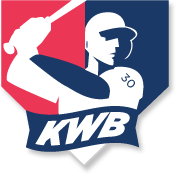The following is an excerpt from The #GoodBatting Book, which has helped hitters and hitting coaches around the world understand WHY they do what they do.
Embrace Your Role
There comes a point in a lot of player’s careers when they transition from an everyday player to a lesser role, which is widely known as a “bench player.”
If you are playing high school baseball, you may likely be the best player on your team, or at least in the starting lineup. That is a testament to your preparation, hard work and skill set, and you should be proud of that accomplishment thus far.
What I’m about to walk you through, however, is information that will become necessary quicker than you think as you continue to climb the ranks in collegiate and/or professional baseball.
When most guys get to college baseball for the first time, it is their first introduction to being at the bottom of the totem pole. No matter how good they are, or how many awards and accolades they brought with them to school, they are now just another number on a back of a uniform. They are officially a part of a level that very few players get to play at.
The toughest part of my transition to the college game was just that – sitting and waiting. Every level I had played at until that moment, I was one of the better players, or the best player, on my team. I had a rude awakening in college to a number of things, but that first year “on the job” was one of the hardest years in my playing career, being a “bench player.”
When guys find themselves on the bench for the first time, the first thing that gets dinged is the ego. Every player has one. It’s pride. It’s ego. It’s everything that makes you the player and competitor that you are. For a coach to sit you down and basically tell you that he thinks he has better at the moment, stings for sure. Especially if it’s your first time experiencing that.
As a hitter, it’s a lot easier to maintain timing, rhythm, etc. at the plate when you play everyday. It doesn’t necessarily mean that you are going to have great success just because you play everyday, but it is a big advantage that allows you to maintain your timing at the plate.
Know Your Role
The best piece of advice I can give to you is understand and embrace your role. If you become a bench player, do not complain about it. Accept and embrace it.
It’s easy to feel good about being in the starting lineup. Your swing will feel better playing everyday. Your mindset will be better seeing your name on the lineup card as part of the starting nine.
What’s hard is feeling motivated and locked in when you’re on the bench. I have been on both sides of this. I can tell you from experience that being a bench player is no easy task. In fact, I respect the bench players in the big leagues more than I respect the everyday players because of their relentless focus on being prepared each and everyday like they are a starter, not knowing if they will ever get in that game that night.
With that being said, hitters need to see live pitching every day to feel like they are on time and in rhythm. There is only so much you can do with BP and standing in on live bullpens. You need to feel the rhythm of the game in live action. But when you’re a bench player, you don’t get those luxuries.
What can a hitter do to keep himself ready for when the head coach calls your name?
Here are some suggestions I have for those experiencing lack of playing time.
First, come to the ballpark each and everyday mentally prepared to start. It’s easy to come to the ballpark dejected expecting not to play. It’s harder to get your mind right on the way to the park knowing you may not play, but it can be done.
The reason we do that is because if I told you that you were starting tomorrow night on your way out of the stadium, you would be coming to the park excited and more focused on your preparation for the game. So what’s the difference if I did or did not tell you?
The pre-game preparation and routine should not really change if we are or are not in the starting lineup. If your name’s not on the card, it’s easy to hang in the clubhouse and cut corners on your pre-game routine because you may not feel you need to do it. Just because you’re not being used at the beginning of the game, doesn’t mean that you won’t be called upon to pinch hit, or be put in for defensive purposes later in the game. So prepare mentally and physically like you are starting each and everyday. Take a look at who their relief pitchers are and start trying to formulate plans or ideas so when you face them you have prepared at least a little bit, if not a lot, to have a quality at-bat against them later in the game.
The first time you think about pinch-hitting for someone should not be when the coach calls your name. You have been preparing both physically and mentally for that one opportunity since you arrived at the ballpark.
During the game, you need to pay attention to the flow of the game and try and stay with what you think the head coach will do. Not only does this keep you focused on the game itself, it also allows you to mentally try to predict and learn your head coach and his tendencies.
For example, it’s the fifth inning and you feel like you can be a pinch hitter for one of the weaker hitters in your lineup the next few innings. Take it upon yourself to start stretching and swinging a bat around the dugout. Take a look at the pitcher on the mound and start thinking about your approach against him. Look into their bullpen (if they have one) and think about who you might be facing. If your head coach is into matchups, think about how he might use you with a LHP or RHP on the mound.
And lastly, when it comes to the swing itself, bench players need to have a swing that is compact, simple that does not have a lot of movement. If you have a huge leg kick and only playing once a week, you may want to reconsider. If you have a long swing that tries to produce power, that won’t help you when it comes to timing. Take a look at swings in the big leagues of the bench players. For the most part, they are simple and short with no wasted movement.
When you haven’t seen velocity from a pitcher in a week and then get thrust into a game, the speed of the pitch looks to be faster than it really is. This is why you need a simple and quick swing to catch up.
Hitters who embrace their role as a bench player are special. They are total “team players” in every sense of the word. In my opinion, they have the hardest job of anyone on the team because hitting is rhythm, timing and balance. The game speeds up if you don’t get at-bats on an everyday basis.
When it’s your turn to become the “bench player” whether it be at 32 years old in the big leagues, or your first year of college, make sure you accept your role and never deviate from your preparation.
Heroes are made in the ninth inning. Not during the first pitch.
For more than a decade, Kevin Wilson has been one of the most respected hitting coaches in the game. He works behind the scenes as a private hitting consultant to some of the best hitters in Major League Baseball. In 2013, Kevin was the hitting coach for the USA Baseball 18U National Team. Team USA beat Japan for the Gold medal at the IBAF World Cup in Taichung, Taiwan.
He is the author of the Amazon #1 Best Seller The #GoodBatting Book and co-hosts a popular podcast, KWB Radio, that showcases unique conversations with the pros. If you want Kevin to speak at your next event or if you want take advantage of his popular 2-day KWB Experience for players and coaches, contact Kevin today!
Follow Kevin on twitter @KWBaseball and visit his website KWBaseball.com


